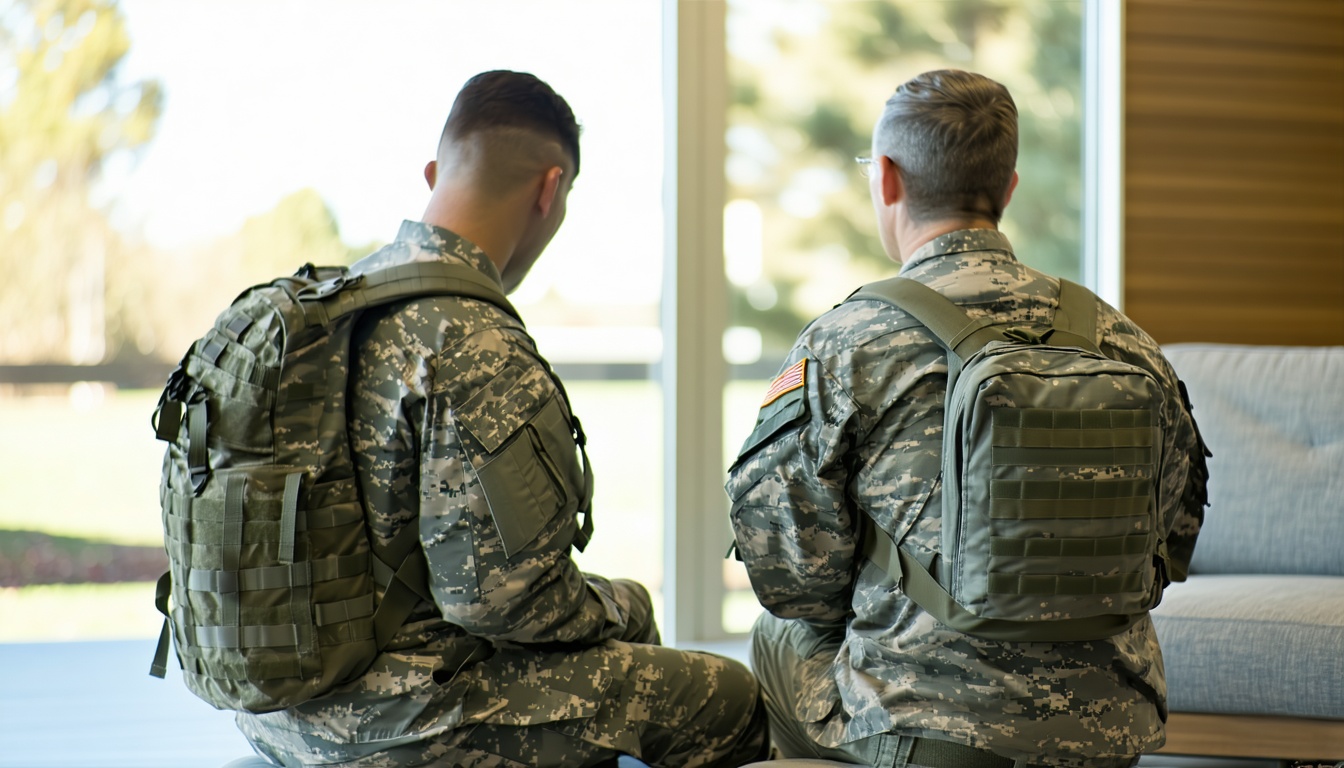Understand veterans addiction support
When you or a loved one begins the journey of finding veterans addiction support, it can feel overwhelming and uncertain. Veterans often face a combination of stressors that stem from military service, including exposure to combat and prolonged separations from loved ones. These experiences may increase the likelihood of post-traumatic stress disorder (PTSD), anxiety, depression, or other mental health concerns. According to recent data, approximately 60% of Veterans with mental health issues do not seek treatment, despite high rates of addiction and co-occurring disorders [1].
While many veterans might feel alone in this struggle, you should know that specialized care exists to meet your specific needs. Quality programs build on proven therapeutic models and holistic therapies that not only address substance use but also honor the complexities of military life. If you are searching for a comprehensive men’s drug and alcohol detox and rehab service, Recovery Bay Center offers a dedicated environment that helps you take the first important steps toward renewed well-being.
Why veteran-focused care matters
Veterans benefit from programs that acknowledge the link between trauma and substance use. Stressors during active duty or deployments can trigger coping mechanisms, such as alcohol or drug use, that eventually spiral into addiction. As a result, you need treatment protocols that address both mental and physical health simultaneously. Integrated approaches blend evidence-based strategies with robust, veteran-specific support systems, fostering a sense of shared experience.
Treatment also involves addressing misperceptions around stigma. Many veterans feel hesitant to seek help due to fear of judgment or concerns about being perceived as weak. However, current data underscores the effectiveness of professional care. Millions of veterans enter and remain in recovery each year through various support structures, including family-focused programs, group therapy, and specialized counseling [1]. By choosing an experienced facility that understands these issues, you can find a pathway to stability and long-term success.
Recognize unique challenges
Veterans may face several unique obstacles on the road to recovery. These challenges can range from reintegrating into civilian life to balancing family obligations. When searching for the right facility, it helps to understand the ways in which these concerns can intensify substance use and how holistic treatment approaches can mitigate damaging cycles.
Combat experiences and mental health
If you or a loved one served in high-stress environments, you may have witnessed or experienced traumatic events that contribute to PTSD, anxiety, or depression. Researchers note that PTSD stands out as a significant risk factor, putting veterans at higher risk of developing addiction issues [2]. PTSD can manifest as flashbacks, nightmares, and extreme hypervigilance. Without proper intervention, the urge to self-medicate using drugs or alcohol grows stronger.
Recovery Bay Center for men can help address these concerns by integrating trauma-informed therapies, such as trauma informed therapy and emdr trauma therapy. These strategies gently expose the root causes of your struggles. By creating a supportive and structured environment, you can begin to heal from the emotional wounds that might drive you toward destructive patterns.
Social and family dynamics
Family members often serve as a key pillar of support for veterans, but relationships may carry tension relating to transitions between civilian and military life. Unresolved conflicts, shifts in family roles, and expectations can all compound emotional strain. In addition, some veterans isolate themselves, feeling that family and friends do not understand their experiences. As a result, you might feel tempted to withdraw further into substance use.
Appropriate programs work alongside families to solidify healthy relationships. For instance, inviting loved ones to participate in family therapy sessions can help everyone better understand each other’s perspectives and needs. By opening lines of communication, you can diffuse tension and nurture a consistent support network, significantly increasing the chances of a smooth long-term recovery.
Barriers to seeking help
Even after recognizing a substance use issue, cultural or institutional barriers sometimes stand in the way of care. Negative beliefs around addiction, limited access to veteran-friendly facilities, and financial worries can dissuade you from starting treatment. In certain cases, the severity of depression itself can inhibit initiative; you might know you need help but feel unable to act on that awareness.
Fortunately, more healthcare providers now offer improved resources for veterans. Admissions navigators can help you verify insurance coverage, while expanded services within both VA and private programs offer flexible levels of care, including medical detox, residential treatment, and sober living [1]. By selecting a men’s rehab that features reputable care and an empathetic community, you can overcome challenges that once seemed impossible to surmount.
Examine specialized therapies
A balanced and evidence-based approach plays a crucial role in veterans addiction support. This means using treatment modalities backed by scientific research, as well as newer methods tailored to military experiences. By choosing a men’s rehab facility such as Recovery Bay Center, you will gain access to a range of interventions designed to address both immediate symptoms of substance use and the core issues that fuel it.
Evidence-based treatments for veterans
Clinical experts highlight the effectiveness of cognitive behavioral therapy (CBT), contingency management, and problem-solving therapy as common evidence-based interventions used among veterans [3]. CBT targets the connection between your thoughts, feelings, and behaviors. By reshaping negative thought patterns, you can gain clarity and coping methods to resist relapse. Contingency management rewards positive choices, like remaining drug-free or attending regular counseling sessions. Problem-solving therapy offers structured ways to tackle daily challenges that can become overwhelming, particularly for those dealing with mental health concerns like PTSD.
Recovery Bay Center may integrate these approaches in combination with supportive methods such as peer support alumni groups. Peer-driven models help build community among men who have shared experiences. Seeing others succeed in their own sobriety can spark motivation, reduce isolation, and reaffirm your commitment to recovery. When you pair these interventions with medical supervision or medication-assisted treatment, you create a strong advantage for long-term success.
Dual diagnosis for co-occurring conditions
Many veterans struggle with co-occurring mental health disorders, such as depression, anxiety, or PTSD. These conditions can exacerbate substance misuse and vice versa, generating a cycle that calls for expert intervention. A dual diagnosis approach ensures you receive help for any psychological barriers while simultaneously treating drug or alcohol addiction.
Recovery Bay Center specializes in dual diagnosis therapy, delivering integrative solutions that help stabilize mood, reduce withdrawal complications, and form healthier coping habits. When you understand how emotional distress impacts relapse, you become better equipped to break the pattern. This can lessen the sense of shame or frustration you might feel, replacing it with productive habits and emotional resilience.
Tools for better stress management
Therapy goes beyond traditional counseling to include complementary activities that improve mental and physical well-being. Veterans, in particular, may benefit from soothing exercises such as yoga therapy residential and meditation therapy residential. Studies show that these practices can help reacquaint you with your body, mitigate stress responses, and clear the mind of racing thoughts. Other frameworks, such as holistic therapy, optimize healing by focusing on body, mind, and spirit together.
Your recovery plan might also incorporate nutrition support rehab, an often-overlooked aspect of self-care. Balanced meal plans can counter the nutritional deficits that frequently arise when substance use dominates daily life. When you combine these therapies with conventional methods, you bolster results and maintain a consistent sense of stability.
Explore benefits of men-focused programs
You might wonder why choosing a men’s rehab center specifically makes a difference. The answer often lies in the power of camaraderie and shared experience. Men sometimes face distinct societal pressures that discourage open discussions of vulnerability. This can push you to hide emotional distress, ultimately contributing to higher rates of substance misuse. Weaving men’s issues into group therapy can help reduce this tendency and normalize seeking support.
Building a brotherhood
Men in recovery benefit from forging a sense of community rooted in collective understanding. When you share your experiences in a group of peers who have faced similar struggles, you can release resentment and shame that may have isolated you in the past. Many men’s programs tailor group offerings to explore real-life stressors, allowing you to gain insights from others who have overcome parallel scenarios.
For veterans, the transition to civilian life can be a source of confusion and stress, so connecting with other men who have endured a comparable shift is invaluable. At Recovery Bay Center, you will find support groups that promote reciprocal accountability. You do not just rely on staff, but also on peers who can encourage you to stay dedicated. Sharing triumphs and setbacks fosters a deep sense of unity that serves as a core pillar of continuous recovery.
Addressing stigma and masculinity
Society often perpetuates a belief that men should handle struggles independently, painting vulnerability as weakness. However, acknowledging emotional hardship is far from weak. In fact, being honest about personal battles requires bravery and is an integral step toward genuine healing.
Men-specific rehab programs are structured to dismantle these longstanding stigmas. Therapists and counselors create an environment in which you feel safe expressing unresolved feelings, raw fears, and uncertain ambitions. As you let go of stereotypical expectations, you pave the way for deeper introspection and self-discovery.
Reinforcing healthy routines
Participating in structured daily activities promotes discipline and self-care — two pivotal habits for a strong recovery foundation. Men’s programs often emphasize exercise, balanced diets, mindful practices, and robust social interaction. When you incorporate elements like structured outdoor fitness and nutrition counseling, you nurture both the physical and emotional aspects of yourself.
Furthermore, incorporating stress-relief measures, such as stress management therapy, helps you refocus on what truly matters. As an added benefit, you become more adept at handling external pressures without leaning on addictive substances. By regularly engaging in these routines, you consistently reinforce a more positive self-image, one that aligns with achieving lasting health and sobriety.
Discover Recovery Bay Center’s approach
When you decide to begin your journey, you deserve a facility that recognizes the profound need for veterans addiction support and men-focused care. Recovery Bay Center aligns treatment methods with what is most beneficial for men overcoming detox periods, mental health crises, and the complexities of addiction. By taking advantage of these specialized services, you set the stage for ongoing progress, empowerment, and self-sufficiency.
Safe environment for detox
One major step in the healing process is undergoing detoxification in a supportive environment. If you have concerns about painful or risky withdrawal symptoms, you can find reassurance in Recovery Bay Center’s safe withdrawal environment, where medical professionals provide 24/7 supervision to help minimize discomfort. This includes access to medical staff detox services that closely monitor vital signs and tailor treatments to your needs.
Medication-assisted therapies, such as suboxone treatment rehab or vivitrol treatment program, may be used to reduce cravings and stabilize your physical state. By mitigating withdrawal risks upfront, you gain a stronger platform to focus on the psychological aspects of your recovery.
Addressing co-occurring disorders
Veterans often deal with multi-layered disorders stemming from past traumas. PTSD, depression, traumatic brain injuries, and anxiety can all intensify substance use. At Recovery Bay Center, clinicians focus on comprehensive care that acknowledges these overlaps. This might include specialized counseling and men’s mental health counseling sessions, ensuring your recovery plan attends to the root causes of addictive behavior.
Staff employ trauma-informed strategies and the latest research on veterans’ mental health. Treatments like individual therapy and group therapy promote open dialogue while building internal resilience. This blend of clinical expertise and peer connection paves the way for lasting change, guiding you through each important milestone.
Holistic and experiential therapies
Traditional therapies remain crucial, but sometimes you also need alternative modalities to address lingering stress, fatigue, and emotional wounds. Personalized programs at Recovery Bay Center include holistic therapy, allowing you to explore your internal landscape in constructive ways. You might discover that beach therapy rehab setting sessions alleviate your tension, or that yoga therapy residential routines reduce anxiety and improve focus.
Many men also find spiritual or mindfulness-based practices beneficial to their growth. Centers with a holistic slant will typically offer meditation therapy residential, journaling workshops, or structured mental health support to cultivate self-awareness. By engaging all aspects of your well-being, you can make steadier progress.
Ongoing community and accountability
Once formal treatment ends, continuing care ensures that you remain vigilant about relapse triggers. Through peer support alumni programs, you talk with fellow clients who have progressed in their recovery journeys. You may choose to stay engaged in periodic outpatient step down care or a sober living referral if you prefer a gradual transition back into everyday routines.
Recovery Bay Center also embraces relapse prevention therapy as part of long-term success. This approach equips you with emergency coping strategies, stress-reduction techniques, and emotional regulation skills. By staying in contact with professionals and peer communities, you never have to feel alone in the face of challenges.
Embrace supportive care
Your healing trajectory benefits from broader supportive frameworks. Not only do evidence-based methods address pressing medical concerns, but additional programs can empower you to engage with life from a new standpoint. Veterans who utilize community, family, and professional alliances tend to see improved outcomes and a renewed sense of accomplishment.
Family collaboration
A solid family network can stabilize your progress, reminding you that you are not isolated or undervalued. Encouraging relatives to attend family therapy sessions allows them to better comprehend your experiences. Therapeutic interventions can guide them on how to communicate effectively, set healthy boundaries, and offer constructive support.
Shared understanding streamlines the transition into daily life outside the rehabilitation environment. Partners, parents, or siblings can recognize how to help you circumvent triggers and avoid interactions that may jeopardize your sobriety. Consequently, tension subsides, and your home can transform into a nurturing backdrop for continued success.
Relapse prevention strategies
Staying sober after completing a primary program requires ongoing vigilance. Substance use triggers can appear unexpectedly, and stressors connected to your military past may persist. To bolster defenses against relapse, well-rounded strategies might include:
- Regular participation in recovery support groups for accountability
- Access to telehealth case management if distance or scheduling is a concern
- Continued individual therapy for emotional processing
- Holistic modalities like men’s holistic wellness to reinforce self-care practices
- Consistent employment assistance rehab or legal aid referral, if needed
Each of these resources addresses potential pitfalls and helps you manage life events in a constructive way, reducing susceptibility to unhealthy coping mechanisms.
Strengthening personal resilience
Recovery shines brightest when you develop a deeper understanding of yourself. Ongoing education around health, mindful communication, and self-worth fosters this growth. Responsible lifestyle changes may involve responsible substance use education, thorough mental health support, and re-engagement in meaningful activities.
If you worry about encountering adversity, lean into the teachings of structured recovery plan frameworks. By following daily goals, practicing self-assessment, and committing to spiritual or reflective exercises, you can sidestep the stagnation that often accompanies post-rehab life. Over time, you will notice improvement in your ability to cope with stress and accept new responsibilities with confidence.
Select the right partner
It is important to weigh your options carefully. Not all treatment providers specialize in men’s rehab or recognize the nuances of veteran experiences. Recovery Bay Center stands out for its compassionate focus on men’s challenges, including the intersection of masculinity, mental health, and military service. This atmosphere of empathy, practical guidance, and professional insight aims to remove worry about biases or misunderstandings.
Clinical teams include experts in detoxification, medication-assisted recovery, and mental health management who ensure your safety and comfort. They collaborate with you when setting goals, identifying your personal triggers, and noting progress markers. Over time, you can learn to navigate life’s complications without reverting to old habits. The path is not always simple, but the right partner eases difficulties and fosters self-discovery.
Why Recovery Bay Center for veterans
When you choose Recovery Bay Center as your provider, you gain the following benefits:
- Men-centered environment: Programs designed to address concerns stereotypically linked to men and veterans, such as societal pressure to appear “tough” or financially responsible.
- Holistic rehabilitation options: Access to integrative therapies, including holistic wellness therapy, physical fitness, mindful nutrition, and spiritual components.
- Evidence-based structure: Consistent use of proven models like CBT, medication-assisted treatment, dual diagnosis, and contingency management.
- Expert staff: Clinicians experienced in treating substance use and mental health issues in veterans, offering unwavering support throughout your journey.
- Robust alumni community: Sober community alumni program and peer support alumni sessions that decrease the risk of relapse and cultivate hope.
By selecting a facility that confidently addresses the demands of both addiction and underlying mental health conditions, you are taking a meaningful step forward. Veteran-specific challenges need specialized responses, and with a partner like Recovery Bay Center, you or your loved one can gain the tailored care required to transform difficulties into lasting and positive change.
Frequently asked questions
-
How long does veteran-focused rehab typically last?
Treatment duration varies depending on personal circumstances, medical history, and the severity of addiction. Many programs last a few weeks to several months. After completing an initial phase of care, you can often engage in outpatient step down care or a sober living referral to transition gradually and maintain momentum. -
What is the difference between general rehab and a men’s or veteran-focused program?
Men’s rehab provides gender-specific settings where therapists concentrate on issues, expectations, and concerns common among men, including those with military backgrounds. Veteran-focused programs place extra emphasis on traumas, reintegration challenges, and stressors typically encountered by those in military service. -
Does insurance cover veteran-specific addiction support?
Many insurance plans, including those linked to the VA, offer coverage for substance abuse and mental health services. It is wise to contact admissions or your insurance provider to verify specific benefits. Some facilities offer admissions navigators who assist veterans in understanding options and completing necessary paperwork. -
Will I receive medical detox if needed?
Yes, if medical detox is required, you can often find a safe and supportive environment. Recovery Bay Center, for instance, provides on site medical care coupled with 24/7 nursing support, ensuring your well-being during withdrawal and transition into rehabilitation. -
Can family members participate in my recovery process?
Absolutely. Many programs encourage family involvement, and some even offer dedicated family therapy sessions. Partners, parents, siblings, or children can play a vital role in offering emotional support, creating a united approach to overcoming addiction, and reducing potential relapse triggers at home.
By fully understanding the needs of men who have served, you or your loved one can find a supportive path out of addiction. Veterans have worked hard for the country, and now it is time to receive solid treatment and tools to forge a healthy, substance-free future. Recovery Bay Center stands ready to help, combining specialized knowledge, empathetic guidance, and industry-leading resources that give you the best opportunity for a transformation that lasts.





